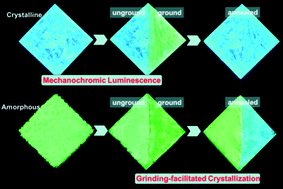The effect of mechano-stimuli on the amorphous-to-crystalline transition of mechanochromic luminescent materials†
Abstract
Mechanochromic luminescence via grinding-induced crystalline-to-amorphous transition in some organic materials has been well illustrated in recent years. Here, we focus on the luminescence reversion process induced by thermal annealing crystallization of a series of tetraphenylethene analogues. Through paired comparisons, we disclosed that the mechano-stimuli can not only destroy the crystallinity of crystalline materials but can also bring a significant effect on the amorphous-to-crystalline transition of amorphous materials. That is, only when an amorphous material underwent mechano-stimuli can it crystallize by thermal annealing to recover its emission. This grinding-facilitated annealing crystallization is rationalized to originate from the twisted and rotatable intramolecular conformation that can be altered by mechano-stimuli. Besides some special usage of the material as security paper or latent memory medium, the study presents new strategies to control the crystallization of organic semiconductors.

- This article is part of the themed collection: Editor’s Collection: Mechanochemistry

 Please wait while we load your content...
Please wait while we load your content...